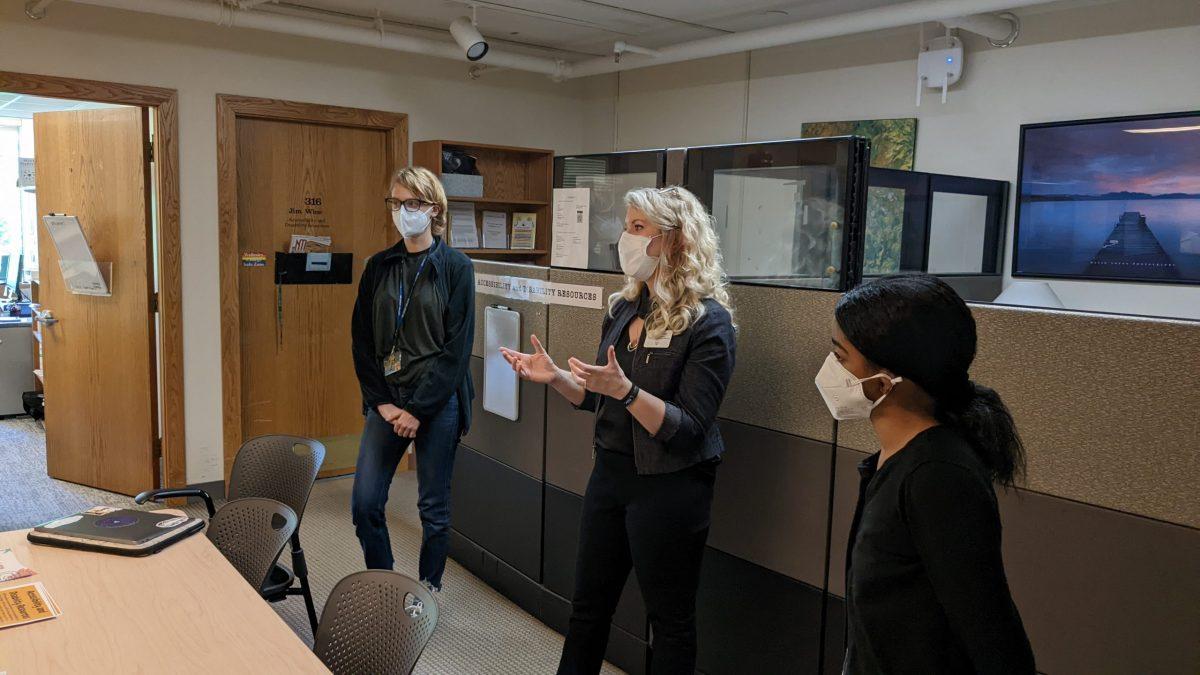On Sept. 12, the Wellesley Office of Accessibility and Disability Resources (ADR) held its first annual student orientation panel. With hand-crafted zines and panel presentations, assistant director Becky Melville and student access advocates (SAAs) — students employed by ADR — introduced the ADR staff and shared information about accessibility and disability resources at Wellesley.
In addition to inviting all students to ask questions, the orientation panel supplemented the information about ADR provided during first-year orientation.
“Orientation can be super helpful, but can be kind of overwhelming because there is so much information. We wanted to plan something … just to provide students with a little bit more personalized information about ADR and with the opportunity to ask questions they might not have had the opportunity to ask,” Melville said.
Iris Martinez ’24, an SAA who worked closely with the ADR team to lead the organization of this event, personally found it somewhat difficult to absorb information during their virtual first-year orientation.
Through their work as an SAA, Martinez hopes to create more space for the discussion of accessibility and disability on campus.
“I’ve always wanted to be in a bit of an advocacy role because there’s not always a ton of information about it … , but there are things we can do … to make the world better for accessibility,” Martinez said.
SAAs aim to act as advocates and as a resource for all students, particularly providing support for those who do not feel comfortable discussing their needs and questions with administrators. They host weekly office hours for students and respond to emails or direct messages sent through the ADR website. In addition, SAAs organize events like the student orientation panel, take on administrative tasks and help to provide student resources, like the network of student note-takers coordinated largely by SAA Lidewij Florusbosch ’24. Martinez’s most recent projects include updating the ADR website, including its page for students seeking note-taking support, and creating captions for video course materials.
During the hybrid event, Melville introduced students to the role of ADR on campus. As SAAs, Sasha Leys ’23 discussed Assistive Technology options, Florusbosch discussed some differences between high school and college accommodation processes and Martinez discussed the role of SAAs on campus. The team distributed zines containing information about resources available through ADR, including Kurzweil, a text-to-speech program that recently became free to download for all members of the Wellesley community. All resources can be found on the ADR Assistive Technology page. Melville noted that ADR can work with students registered with its office to access other forms of Assistive Technology and to make Assistive Technology financially accessible.
Despite the small student turn-out for the orientation panel, Martinez and Melville hope that students will discover available resources through conversations with the ADR staff and by visiting the ADR website and Linktree. In addition to scheduled meetings, Melville will also offer weekly drop-in office hours, listed on the ADR website, as a new resource for all students.
“I have started doing … drop-in hours because I have recognized that…sometimes, people don’t know what they want or need … or just have a quick question, so they don’t necessarily want to wait a week to get in to see me,” Melville said.
Martinez recognized that there is much to be done to improve accessibility on campus. They and Melville share the goal of encouraging a more proactive approach to accessibility on campus that will make a greater number of resources more universally available and make spaces more accessible before people need to use them.
As ADR works to improve and extend accessibility and disability resources, Melville looks forward to engaging with students through a greater number of hybrid events planned for the year.
In the coming months, Martinez will host meetings for the ADR book club that they founded this year. The book club highlights a diverse array of stories written by and about people with disabilities.
“I’m trying to [help] make sure that people are aware of accessibility issues on campus and … aware of the really diverse range of experiences that [people with] disabilities have,” Martinez said, speaking of their work as an SAA.






